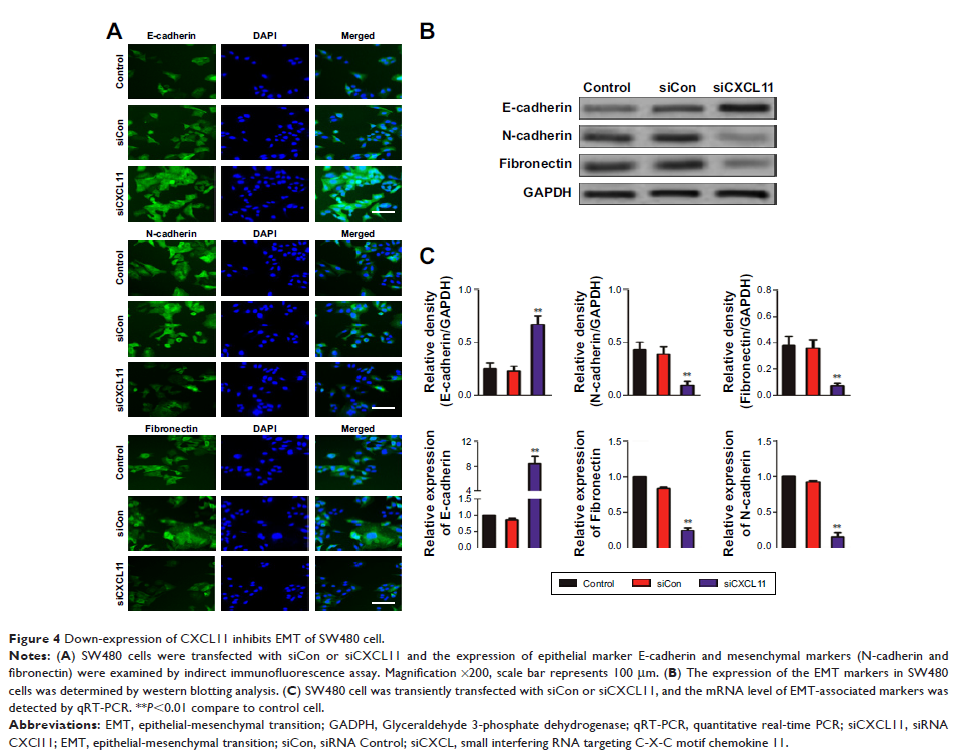108384
论文已发表
注册即可获取德孚的最新动态
IF 收录期刊
- 3.4 Breast Cancer (Dove Med Press)
- 3.2 Clin Epidemiol
- 2.6 Cancer Manag Res
- 2.9 Infect Drug Resist
- 3.7 Clin Interv Aging
- 5.1 Drug Des Dev Ther
- 3.1 Int J Chronic Obstr
- 6.6 Int J Nanomed
- 2.6 Int J Women's Health
- 2.9 Neuropsych Dis Treat
- 2.8 OncoTargets Ther
- 2.0 Patient Prefer Adher
- 2.2 Ther Clin Risk Manag
- 2.5 J Pain Res
- 3.0 Diabet Metab Synd Ob
- 3.2 Psychol Res Behav Ma
- 3.4 Nat Sci Sleep
- 1.8 Pharmgenomics Pers Med
- 2.0 Risk Manag Healthc Policy
- 4.1 J Inflamm Res
- 2.0 Int J Gen Med
- 3.4 J Hepatocell Carcinoma
- 3.0 J Asthma Allergy
- 2.2 Clin Cosmet Investig Dermatol
- 2.4 J Multidiscip Healthc

CXCL11 的下调抑制结肠直肠癌细胞生长和上皮 - 间质转化
Authors Gao YJ, Liu DL, Li S, Yuan GF, Li L, Zhu HY, Cao GY
Received 11 March 2018
Accepted for publication 22 July 2018
Published 23 October 2018 Volume 2018:11 Pages 7333—7343
DOI https://doi.org/10.2147/OTT.S167872
Checked for plagiarism Yes
Review by Single-blind
Peer reviewers approved by Dr Colin Mak
Peer reviewer comments 2
Editor who approved publication: Dr Jianmin Xu
Background: The poor prognosis of colorectal cancer (CRC) largely results from local
invasion and tumor metastases. Epithelial-mesenchymal transition (EMT) is a key
step in the progression of solid tumors and plays a vital role in tumor
metastasis. Recent studies demonstrate that C-X-C motif chemokine 11 (CXCL11)
is involved in various cancers’ progression. However, its biological activity
in CRC needs deeper exploration.
Methods: The level of CXCL11 in CRC tissues and cell lines was determined using
the quantitative real-time PCR (qRT-PCR) assay. The MTT, colony formation,
wound healing and Transwell invasion assays were applied to assess the role of
CXCL11 in CRC cell growth, migration and invasion, in vitro, respectively. A
xenograft model was constructed to analyze the function of CXCL11 in CRC cell
growth in vivo.
Results: CXCL11 was over-expressed in CRC tissues and cell lines. Repression of
CXCL11 significantly inhibited CRC cell migration, invasion and EMT in vitro.
In addition, down-regulation of CXCL11 reduced CRC cell growth and metastasis
in vivo. Finally, we revealed that repression of CXCL11 inhibited the
metastatic ability of CRC cell in a N-cadherin dependent manner.
Conclusion: In summary, this study explicates the oncogenic activities of CXCL11 in
CRC cell growth and metastasis.
Keywords: colon cancer, CXCL11, migration, invasion, EMT
